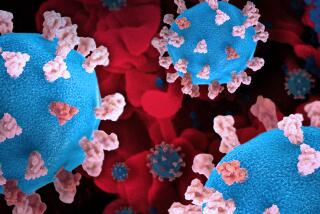French Drug Has Caused AIDS to Nearly Disappear in 1 Patient
- Share via
NEW YORK — An experimental drug that blocks reproduction of the virus believed to cause AIDS has caused the infectious agent to nearly disappear in the blood of a young male hemophiliac, researchers said Friday.
The patient’s treatment with the drug HPA 23 was discontinued a year ago, and he is well enough to return to school, said Jean Claude Chermann of the Pasteur Institute in Paris, who led the research.
“We stopped here, because we did not know how to evaluate the treatment,” Chermann said.
The drug is now being given to 34 persons with acquired immune deficiency syndrome to help researchers evaluate it, he said.
Two Known Viruses
Chermann made his remarks at a daylong AIDS symposium in New York sponsored by the Scientists Institute for Public Information and the AIDS Medical Foundation.
At the symposium, Luc Montagnier, another Pasteur Institute researcher, said there are now at least two known classes of AIDS viruses. The viruses are different enough that it might be difficult to make a single vaccine to protect against both of them, Montagnier said.
Chermann’s is the latest in a series of 55 drugs that have been made to try to find an anti-viral agent.
Administration of the drug to the young hemophiliac reduced the virus to the point where it could no longer be identified, Chermann said, but the patient’s system apparently still contained some virus, because his cells were able to pass the infection to other cells in the laboratory.
‘Stopped Replication’
“We were not killing the infected cells, but we stopped replication,” Chermann said.
Studies with the drug follow reports of at least two potential anti-AIDS agents identified in the United States.
A drug called suramin has shown some ability to fight AIDS in initial tests and is now being given to AIDS patients in an expanded experimental trial, the National Institutes of Health said.
Another anti-viral drug called ribavirin may soon be tried with humans, the Centers for Disease Control in Atlanta said.
More to Read
Sign up for Essential California
The most important California stories and recommendations in your inbox every morning.
You may occasionally receive promotional content from the Los Angeles Times.













